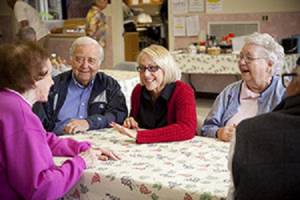Families of a loved one who has received a diagnosis of Alzheimer’s disease will be pained to hear the devastating news. The senior, too, will be upset to know the progressive brain condition has taken hold. Adjustments to daily life are inevitable for family members and the affected individual.
Discussing the senior’s wishes for long-term care early on gives families peace of mind, since they will be able to implement care in accordance with the loved one’s desires. Most seniors express the wish to remain in the familiar environment of home. This means in-home care is a viable option.
Understanding Alzheimer’s disease helps families cope with the distressing changes that are bound to occur in their loved one. While memory is affected due to the death of brain cells, Alzheimer’s also makes daily tasks, like bathing and eating, nearly impossible to perform without assistance.
1. Memory

Forgetting new information, like dates and events, is a common symptom of Alzheimer’s. In conversation, seniors may ask the same questions repeatedly. Memory aids, like notes, become a mainstay, and seniors may increasingly turn to family members for help with remembering.
Improvements to memory are possible. Encourage the loved one with Alzheimer’s to engage in brain games, like puzzles, which help to generate new brain cells. Cardiovascular exercise increases blood flow to the brain. Listening to music helps patients with dementia trigger past memories.
2. Communication
Conversing becomes challenging for people with Alzheimer’s. Patients stop mid-sentence and fail to know how to continue the conversation. Due to difficulty recalling words, they replace often-used words with made-up ones; for instance, a dementia patient will call a skunk “that smelly animal”.
Mutual understanding, however, can be achieved by using simple words and short sentences. Give them ample time to respond to questions. Offer words if the seniors struggle with identifying the right words to communicate. Use a calm tone of voice and do not speak down to them.
3. Socialization
 Due to difficulty communicating, people with Alzheimer’s increasingly withdraw from social activities and once-enjoyable hobbies. Socialization, however, helps the elderly stimulate their minds. Taking part in shared activities is also key to reducing the isolation that frequently accompanies Alzheimer’s disease.
Due to difficulty communicating, people with Alzheimer’s increasingly withdraw from social activities and once-enjoyable hobbies. Socialization, however, helps the elderly stimulate their minds. Taking part in shared activities is also key to reducing the isolation that frequently accompanies Alzheimer’s disease.
Encourage the senior to participate in activities that match their interests and levels of ability. Short and simple activities with few steps are appropriate. Break down the steps into manageable ones. Praise the individual for each completed step. When frustration occurs, gently redirect their attention.
Adult day services offer social opportunities and organized activities to people with Alzheimer’s. Day centers provide a safe environment, which keeps vulnerable dementia patients protected. Meals are also provided. Caregivers receive a few hours of respite while the senior is at the center.
4. Incontinence
A lack of bladder and bowel control are common occurrences in people suffering from Alzheimer’s. Changes in the brain make it difficult for dementia patients to control their bladder. Or, seniors may lack the physical ability to get to the toilet in time.
Establishing a bathroom routine reduces accidents in Alzheimer’s patients. Set routine toilet breaks every three hours. Also, 30 minutes after each meal, schedule a restroom visit. Nighttime accidents may be prevented by limiting fluid intake during the evening and before bedtime.
5. Mood Changes
 People with Alzheimer’s are likely to experience increased fear, anxiety, suspicion and confusion. Becoming upset with family and friends is common. As dementia progresses, hallucinations (seeing, hearing or feeling nonexistent things) and delusions (false beliefs thought to be real) may occur.
People with Alzheimer’s are likely to experience increased fear, anxiety, suspicion and confusion. Becoming upset with family and friends is common. As dementia progresses, hallucinations (seeing, hearing or feeling nonexistent things) and delusions (false beliefs thought to be real) may occur.
When the patient is afraid, comfort them. Gently respond to the feelings they express, and try to avoid arguments about what they experience. Also avoid television shows that display violence, since dementia patients are unable to distinguish reality from make-believe.
6. Wandering
Disorientation is caused by any stage of Alzheimer’s. As a result, seniors may wander. The elderly may also wander out of fear, such as when in an overstimulating environment or upon hearing a loud noise. The senior may get lost while searching for someone or an object.
Safeguard the senior by having the individual wear a GPS or tracking device that will send alerts to pre-designated contacts. Place signs on doors to hinder the seniors from opening them. Place pressure-sensitive alarm mats on the floor next to the bed to alert caregivers.
7. Sleep Issues
Sundowning is a common occurrence in people with Alzheimer’s. The condition causes seniors to become irritable or agitated around twilight. The various symptoms of sundowning may be potentially dangerous to the individual living with Alzheimer’s or to the caregivers around them.
Many effective techniques battle sundown syndrome. Encouraging exercise during the day helps to promote better sleep during the night. Limit daytime napping. Also reduce the senior’s caffeine intake later in the day. Create a peaceful evening tone to help the senior wind down for the night.
Alzheimer’s Caregivers
 When your loved one with Alzheimer’s expresses the wish to remain at home for as long as possible, consider including memory care services in the senior’s daily life. Assisting Hands Home Care offers the most compassionate Alzheimer’s and dementia care services in the area.
When your loved one with Alzheimer’s expresses the wish to remain at home for as long as possible, consider including memory care services in the senior’s daily life. Assisting Hands Home Care offers the most compassionate Alzheimer’s and dementia care services in the area.
Trained caregivers from our home care agency are skilled at identifying symptoms of Alzheimer’s and work gently to reduce them. When your loved one wanders, our memory caregivers calmly lead them back. We look past seniors’ angry outbursts and recognize that agitation is a symptom of Alzheimer’s.
Memory care providers at Assisting Hands Home Care also assist with the activities of daily living. We manage incontinence discreetly and help with bathing, grooming and dressing tasks. Our caregivers prepare nutritious meals that meet the dietary restrictions of our elderly care recipients.
Caring for a loved one with Alzheimer’s requires understanding, patience and skill. At Assisting Hands Home Care, we provide all three to ensure the senior in your life thrives in a home environment. Families in the Richmond, Virginia, areas are encouraged to contact us for reliable memory care.




